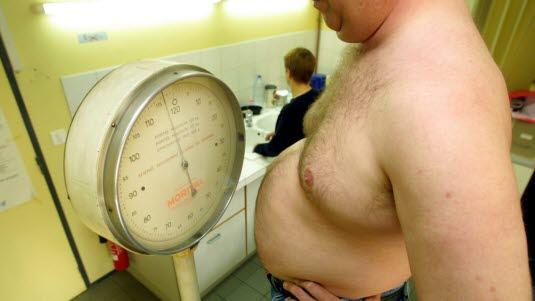Insulinresistens
For lite mosjon i kombinasjon med for høyt næringsinntak over lengre tid kan "trette ut" kroppens insulin, det hormonet som regulerer sukkeromsetningen i kroppen. Dette kan føre til sykdommer som høyt blodtrykk, åreforkalkning og type-2 diabetes.

Sist oppdatert:
15. jan. 2019
Hva er insulinresistens?

Insulin er et hormon som produseres i bukspyttkjertelen (pankreas). Det gjør kroppen i stand til å lagre sukker i vevene. Kroppen bruker lagret sukker til energi - til å utføre arbeid.
Hos noen mennesker som beveger seg for lite mens de spiser litt for mye over lengre tid blir vevene mindre følsomme for insulin. Vi sier at disse menneskene utvikler resistens overfor insulin. Hvis du har insulinresistens, vil bukspyttkjertelen øke utskillelsen av insulin til blodet. Men det vil ikke normalisere blodsukkeret helt, fordi insulinet virker for dårlig.
Insulinresistens henger nøye sammen med andre helseproblemer som økt fett i og rundt buken, nedsatt glukosetoleranse, høyt kolesterol og høyt blodtrykk. Når en person har flere av disse problemene samtidig, kaller vi det insulinresistens syndrom eller metabolsk syndrom.
Vil du vite mer
Dette dokumentet er basert på det profesjonelle dokumentet Metabolsk syndrom . Referanselisten for dette dokumentet vises nedenfor
- Saklayen MG. The Global Epidemic of the Metabolic Syndrome. Curr Hypertens Rep. 2018 Feb 26;20(2):12. PMID: 29480368 PubMed
- Ford ES, Giles WH. A comparison of the prevalence of the metabolic syndrome using two proposed definitions. Diabetes Care 2003; 26: 575-81. PubMed
- Gennuso KP, Gangnon RE, Thraen-Borowski KM, Colbert LH. Dose-response relationships between sedentary behaviour and the metabolic syndrome and its components. Diabetologia 2015; 58:485. PubMed
- Rochlani Y, Pothineni NV, Kovelamudi S, Mehta JL. Metabolic syndrome: pathophysiology, management, and modulation by natural compounds. Ther Adv Cardiovasc Dis. 2017;11(8):215-225. PMID: 28639538 PubMed
- Deen D. Metabolic syndrome: Time for action. Am Fam Physician 2004; 69: 2875-82. PubMed
- International Diabetes Federation, The IDF consensus worldwide definition of the metabolic syndrome (http://www.idf.org/webdata/docs/Metac_syndrome_def.pdf) (April 14, 2005) (accessed June 10, 2005).
- Ilanne-Parikka P, Eriksson JG, Lindström J, et al. Effect of lifestyle intervention on the occurrence of metabolic syndrome and its components in the Finnish Diabetes Prevention Study. Diabetes Care. 2008;31:805-807. PubMed
- GBD 2015 Obesity Collaborators, Afshin A, Forouzanfar MH, et al. Health Effects of Overweight and Obesity in 195 Countries over 25 Years. N Engl J Med. 2017;377(1):13-27. PMID: 28604169 PubMed
- Grundy SM, Brewer HB Jr, Cleeman JI, et al. Definition of metabolic syndrome: report of the National Heart, Lung, and Blood Institute/American Heart Association conference on scientific issues related to definition. Circulation. 2004;109:433-438. PubMed
- Hooper L, Summerbell CD, Thompson R, Sills D, Roberts FG, Moore HJ, Davey Smith G. Reduced or modified dietary fat for preventing cardiovascular disease. Cochrane Database of Systematic Reviews 2012, Issue 5. Art. No.: CD002137. DOI: 10.1002/14651858.CD002137.pub3. DOI
- Adler AJ, Taylor F, Martin N, Gottlieb S, Taylor RS, Ebrahim S. Reduced dietary salt for the prevention of cardiovascular disease. Cochrane Database of Systematic Reviews 2014, Issue 12. Art. No.: CD009217. DOI: 10.1002/14651858.CD009217.pub3. DOI
- Szapary PO, Hark LA, Burke FM. The metabolic syndrome: a new focus for lifestyle modification. Patient Care 2002; 36: 75-88. PubMed
- Ginsberg HN. Treatment for patients with the metabolic syndrome. Am J Cardiol 2003; 91(7A): 29E-39E.
- Bird SR, Hawley JA. Update on the effects of physical activity on insulin sensitivity in humans. BMJ Open Sport Exerc Med. 2017;2(1):e000143. Published 2017 Mar 1. PMID: 28879026. PubMed
- Gaede P, Vedel P, Larsen N, Jensen GV, Parving HH, Pedersen O. Multifactorial intervention and cardiovascular disease in patients with type 2 diabetes. N Engl J Med 2003; 348: 383-93. New England Journal of Medicine
- Mente A, Yusuf S, Islam S, McQueen MJ, et al. Metabolic syndrome and risk of acute myocardial infarction a case-control study of 26,903 subjects from 52 countries. J Am Cardiol 2010; 55: 2390-8. PubMed